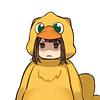Take a photo of a barcode or cover
This volume was really good! It finally felt like things were happening in the war and over-arching story. I loved Flycatcher's story and if the chivalrous knight things was a bit (a lot) over the top, it was all in good fairytale fun.
(Can I just ask, though, what was up with gold-awful art in the interlude about Snow and Bigby's kids learning about their ghost sibling? Christ, it looked like some weird 90s Cartoon Network crap.)
I'm enjoying the story much more, now that they've laid off the boring stuff about Snow's kids. And the focus on Frau Totenkinder is glorious. I LOVE her.
On to vol 11!
(Can I just ask, though, what was up with gold-awful art in the interlude about Snow and Bigby's kids learning about their ghost sibling? Christ, it looked like some weird 90s Cartoon Network crap.)
I'm enjoying the story much more, now that they've laid off the boring stuff about Snow's kids. And the focus on Frau Totenkinder is glorious. I LOVE her.
On to vol 11!
adventurous
dark
medium-paced
This has to be one of my favorite volumes so far. We finally learn the story behind the Frog Prince. Up until now, he's been this lowly janitor for the community supposedly working off "past crimes." However, his story turns out to be much more integral than previously suspected. Well done.
One of the best Fables volumes I've read to date.
Something that occurred to me while reading Fables is that comic book series (not graphic novels, necessarily) seem to be focused more on creating a structure by which many, many stories could be told. Usually, this is a character who can interact with several different situations (look at Superman, Batman, or even Swamp Thing), but with Fables, that structure is the premise itself, that the characters from fairy tales are all real, living in Manhattan, and waging war against the evil from their homelands. It's an idea that's fantastic and cool, and I'm sort of surprised that this is the first time I've seen this premise.
The thing is, the problem with coming up with a structure for a comic book series is that the series threatens to run too long with the idea, and ultimately ruin the series. I feel like a good author is one who can tell a good story, but a great author is one who knows when to end it. One of the things I always admired about Sandman was that Neil Gaiman was at the height of his popularity at that time, and he was riding high on that series. He could have drawn out the series even further, extending the mythology to include Daniel as the new Sandman. And based on Neil's future works, I imagine he could have done it very well. But he had the series in mind as a complete, singular work, not as an ongoing series, and he chose to end it there. Had it run on much further, then he probably would have done a disservice to the series.
Getting back to Fables, though, it takes more than just a cool premise to make a good story, and that's where Bill Willingham gets his due. He has a knack for coming up with the right characters, the right motivations, and giving them to the right fairy tales to make the stories intriguing, interesting, and believable. The Good Prince is about Fly, the name of the character who represents the frog who turned into a prince. He's an honest character, though not naive, and his entire back story plays out over the course of this collection. And it all makes sense, not just in terms of the story as Willingham tells it, but also in the way that it relates back to the original fairy tale. It's one thing to take the original tales and make them modern; it's another to make a whole new mythology around those tales that reflects on modern times, and also hearkens back to the original tales. In fact, for an incredible look at how all the different fairy tales from these stories inter-relate, go read 1001 Arabian Nights.
Like any comic book series, Fables ebbs and flows. There are a number of amazing storylines, but there are also a handful of asides or transitory stories that are less interesting individually, even though they're necessary for the overall story of the series. And that's where I think this particular series does a great job of keeping the story fresh. It sometimes seems like the story has run its course, and that the series may lose some of its punch if it's drawn out further (Let's face it: With War and Pieces, Fabletown has gone to war with the Homelands three times now.), but it manages to stay interesting without feeling forced.
Luckily, neither The Good Prince nor War and Pieces are transitory volumes. Each has a lot of action, a lot of story, and a lot of good characters to keep you reading. These two collection cover the series through issue 75, and as the afterword notes at the end of War and Pieces, the story's not over yet. Given the number of times I've thought it was, and then been pleasantly surprised by where the author took it next, I have faith that the series will remain strong, and that the author will know when to end it.
The thing is, the problem with coming up with a structure for a comic book series is that the series threatens to run too long with the idea, and ultimately ruin the series. I feel like a good author is one who can tell a good story, but a great author is one who knows when to end it. One of the things I always admired about Sandman was that Neil Gaiman was at the height of his popularity at that time, and he was riding high on that series. He could have drawn out the series even further, extending the mythology to include Daniel as the new Sandman. And based on Neil's future works, I imagine he could have done it very well. But he had the series in mind as a complete, singular work, not as an ongoing series, and he chose to end it there. Had it run on much further, then he probably would have done a disservice to the series.
Getting back to Fables, though, it takes more than just a cool premise to make a good story, and that's where Bill Willingham gets his due. He has a knack for coming up with the right characters, the right motivations, and giving them to the right fairy tales to make the stories intriguing, interesting, and believable. The Good Prince is about Fly, the name of the character who represents the frog who turned into a prince. He's an honest character, though not naive, and his entire back story plays out over the course of this collection. And it all makes sense, not just in terms of the story as Willingham tells it, but also in the way that it relates back to the original fairy tale. It's one thing to take the original tales and make them modern; it's another to make a whole new mythology around those tales that reflects on modern times, and also hearkens back to the original tales. In fact, for an incredible look at how all the different fairy tales from these stories inter-relate, go read 1001 Arabian Nights.
Like any comic book series, Fables ebbs and flows. There are a number of amazing storylines, but there are also a handful of asides or transitory stories that are less interesting individually, even though they're necessary for the overall story of the series. And that's where I think this particular series does a great job of keeping the story fresh. It sometimes seems like the story has run its course, and that the series may lose some of its punch if it's drawn out further (Let's face it: With War and Pieces, Fabletown has gone to war with the Homelands three times now.), but it manages to stay interesting without feeling forced.
Luckily, neither The Good Prince nor War and Pieces are transitory volumes. Each has a lot of action, a lot of story, and a lot of good characters to keep you reading. These two collection cover the series through issue 75, and as the afterword notes at the end of War and Pieces, the story's not over yet. Given the number of times I've thought it was, and then been pleasantly surprised by where the author took it next, I have faith that the series will remain strong, and that the author will know when to end it.
The only Fables storyline (so far) that has disappointed me. There is much to like but the deus ex machina resolution brings to whole plot line down. Even though several Fables stories are resolved by "magic", the changes that occur here are huge and completely change the dynamics of the ongoing Fabletown/Adversary conflict. For such a major development, I would have preferred a more satisfying i.e. less magical way of making it happen.
adventurous
medium-paced
Plot or Character Driven:
Plot
Strong character development:
Yes
Loveable characters:
Yes
Diverse cast of characters:
Complicated
Flaws of characters a main focus:
No
Fables at its very finest. This story is epic, filled with depth and punctuated by the pure likeability of the entire cast. The best story in the series since Homelands.





